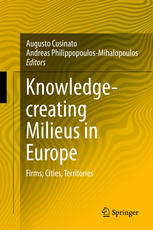

Most ebook files are in PDF format, so you can easily read them using various software such as Foxit Reader or directly on the Google Chrome browser.
Some ebook files are released by publishers in other formats such as .awz, .mobi, .epub, .fb2, etc. You may need to install specific software to read these formats on mobile/PC, such as Calibre.
Please read the tutorial at this link: https://ebookbell.com/faq
We offer FREE conversion to the popular formats you request; however, this may take some time. Therefore, right after payment, please email us, and we will try to provide the service as quickly as possible.
For some exceptional file formats or broken links (if any), please refrain from opening any disputes. Instead, email us first, and we will try to assist within a maximum of 6 hours.
EbookBell Team

4.3
38 reviewsThis book introduces a radically spatialised approach to knowledge creation and innovation. Reflecting on an array of European urban and regional developments, it offers an updated notion of milieu as the conceptual and material space of knowledge and innovation in line with the interpretative turn in social sciences and humanities. In view of the unwillingness of mainstream economics to accommodate such a trend, the authors pursue a broadly understood hermeneutic approach that expands on the triad of knowledge-space-innovation. The book’s main findings are that space is an essential intermediary in the connection between knowledge and innovation, and that a renewed notion of milieu provides the knowledge-space-innovation triad with both an analytical basis and operational power. It also offers fresh insights into the significance and potential of the knowledge economy. A number of empirical European case studies on various scales (organisations, cities and territories) support the findings and suggest new policy directions.